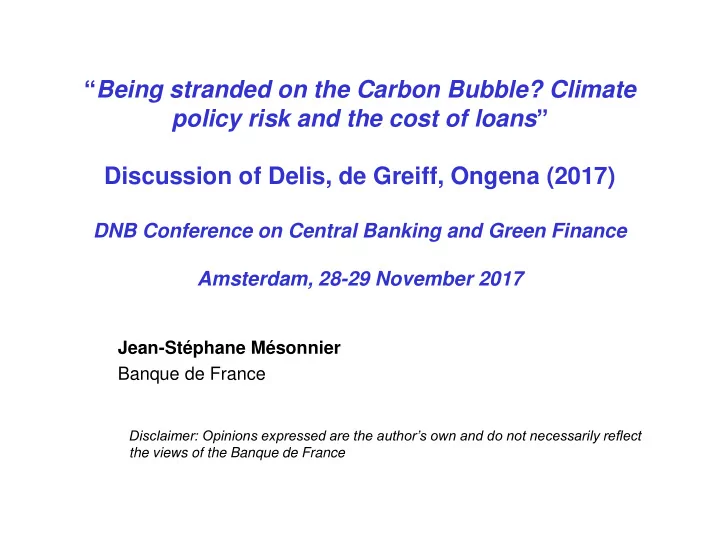

“ Being stranded on the Carbon Bubble? Climate policy risk and the cost of loans ” Discussion of Delis, de Greiff, Ongena (2017) DNB Conference on Central Banking and Green Finance Amsterdam, 28-29 November 2017 Jean-Stéphane Mésonnier Banque de France Disclaimer: Opinions expressed are the author’s own and do not necessarily reflect the views of the Banque de France
This paper • Unburnable fossil fuel reserves may become stranded when (if) climate policies seriously tackle climate change threat and curb emissions • Do bank loans to firms heavily invested in fossil fuel (FF) reserves accordingly command a higher loan rate (=climate policy premium)? If not: “carbon bubble” (term coined in 2011) • Use syndicated loan DB (DealScan) + firm BS info (Compustat) + hand- collected info on firms’ FF reserves (annual reports) • Regress spread of loan on FF dummy, FF-related exposure to heightened climate policies, latter interacted with post-2011 + controls No climate policy premium for FF firms over whole period 1996- 2014[2007/2016] => carbon bubble Premium arises after 2012: hints at nascent market discipline (+23bp tbc average spread of 230bp) 2 Mésonnier - Discussion of Delis, de Greiff, Ongena - Nov. 2017
The issue of stranded assets 3 Mésonnier - Discussion of Delis, de Greiff, Ongena - Nov. 2017
Comments • Important issue (warning required), little evidence so far, neat empirical exercise, findings suggest late wake-up of financial institutions in face of ticking climate bomb • Difficult to comment on a paper selling negative results ! • Nevertheless, the authors could: – Improve statistical description of data – Better highlight economic significance – Conclude with possible policy recommendations 4 Mésonnier - Discussion of Delis, de Greiff, Ongena - Nov. 2017
Comments: data description • Who are FF firms? – List them, country where headquartered, type of business (oil, gas, coal)? How do they compare with others? Test of balanced covariates across firm groupings? – Loan DB coverage of various industrial sectors through time? Any attrition of FF firms in loan database over last two decades? = is some credit rationing at play? • Climate policy indicators – How do they relate to each others? Plot time series of cross- country (rank) correlations – Mix of policy constraints and outcomes => prefer less noisy measures? E.g., OECD’s Environmental Policy Stringency index (EPS). Cf. for instance Albrizio, Kozluk, Zipperer (2014) 5 Mésonnier - Discussion of Delis, de Greiff, Ongena - Nov. 2017
Comments: results and discussion • Some minor technical issues: – Climate policy exposure ( ft ): omitted in tables due to collinearity with FF dummy ( f) ? – Clustered SD: triple dimension ambitious, but beware that lowest dimension binds here (small # of years or banks here) => correction possibly not effective • Discussion of results: – Better highlight economic consequences of findings: compute estimate of subsidy (in dollars) received by FF firms due to absence of climate premium before 2012. Impact on net income? – Is a 20bp premium fair enough? • Policy implications: Climate policies not credible enough? Banks lacking incentives? Should carbon-intensive assets be penalized by bank regulation (e.g., higher capital weights)? 6 Mésonnier - Discussion of Delis, de Greiff, Ongena - Nov. 2017
Recommend
More recommend